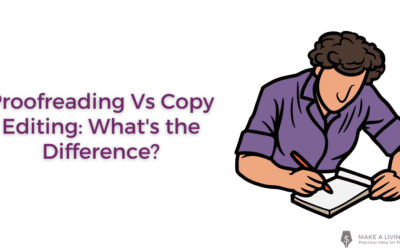If you are someone who already has great writing skills, you might be interested in learning how to become a freelance editor, too.
Editing is one of those great adjacent skills to writing, so it makes sense to offer both to clients, especially if you are trying to make more money.
While editing is different than writing, there are some basics you should know if you want to get your foot in the door of the editing world. In this article, we will be going over all the basics you would need to know to get started.
Freelance Editing: Why Writers Should Consider Editing
Writers should consider becoming editors because the additional skill offers invaluable insights and benefits. If you are already a freelance writer, you will find a ton of benefits from learning how to be an editor as well.
Editing hones a writer’s craft by cultivating a keen eye for detail, structure, and style. It deepens appreciation for language nuances, enhancing the ability to convey ideas effectively.
Additionally, editing offers a diversified skill set, making writers versatile in a competitive market. With trends like AI and other tools on the market, having more skills can make you a better choice for clients to hire.
What Do Freelance Editors Do?
Editors are critical in the writing industry due to writing pieces needing to be fixed and refined before being published.
Their primary responsibility is to review and edit written material to ensure it is clear, concise, coherent, error-free, and meets the intended purpose and target audience.
Here’s a more detailed breakdown of what freelance editors do:
Fixes grammar and language
Freelance editors correct grammatical errors, spelling mistakes, punctuation issues, and ensure consistency in language usage (e.g., American English vs. British English). They also check for proper sentence structure and readability.
Fixes style, tone, and overall clarity
Editors help writers maintain a consistent style and tone throughout the text. Depending on the project, this could involve adjusting the writing to be more formal, informal, persuasive, technical, or creative, as needed.
Freelance editors ensure that the content is clear and coherent. They may reorganize paragraphs, sentences, or sections for better flow and comprehension. They also eliminate jargon or complex language when it hinders understanding.
Freelance editors provide constructive feedback and suggestions to improve the overall quality of the writing. They may make comments or suggestions for rewriting specific sections.
Organizes structure and keeps consistency
Editors review the overall structure of a document, including headings, subheadings, and the logical flow of ideas. They may suggest restructuring or reordering content for improved organization.
Editors maintain consistency in formatting, style, and terminology throughout the document. This includes using the same fonts, headings, citation styles, and terminology as necessary.
Fact-check and proofreading
Depending on the type of content, editors may verify facts, figures, and references to ensure accuracy. This is especially important in non-fiction and academic writing.
Editors perform a final proofread to catch any remaining typos, formatting errors, or minor issues before the document is ready for publication.
Adherence to guidelines
If the document is intended for a specific publication or follows certain guidelines (e.g., a particular style guide like APA or Chicago Manual of Style), editors ensure that these guidelines are followed meticulously.
Managing writers and pieces
Depending on the project, editors may also handle project management tasks, such as setting deadlines, managing multiple editing stages, and coordinating with other team members, such as proofreaders or designers.
Different Types Of Editing Work
Freelance editors can work in various domains, including book editing, academic editing, content editing for websites and blogs, technical editing, and more. They may specialize in certain genres or subject areas to offer expertise in specific niches.
Their goal with almost every piece is to enhance the quality and impact of written content while respecting the author’s voice and intent.
How To Become A Freelance Editor
Transitioning from a writer to a freelance editor can be a rewarding career move or a great additional skill to add to your arsenal.
Here’s a step-by-step guide on how to become a freelance editor while leveraging your writing background.
1. Assess your skills and practice
Evaluate your writing skills, grammar, and attention to detail. Editing requires a strong foundation in these areas.
From there, you will want to practice your actual editing skills if you are a little rusty in this department. Start by editing your own work and volunteer to edit content for friends, colleagues, or local organizations. Building a track record of edited pieces is essential.
2. Learn more techniques to improve your editing skills
Invest in resources and courses that teach editing principles, style guides (e.g., Chicago Manual of Style, AP Style), and industry standards. Consider formal education in editing if available.
You can scroll through the first part of this article to get an idea of the skills required for freelance editors to succeed. There might be some obvious ones for you to identify and work on.
3. Identify your niche
Determine the type of editing you want to specialize in, such as copyediting, proofreading, developmental editing, or niche-specific editing like academic or technical editing.
4. Build a portfolio
Compile a portfolio of your editing samples. Highlight different genres, styles, and subjects to showcase your versatility as an editor.
5. Create an online presence
Develop a professional website or blog to showcase your editing services. Include your portfolio, contact information, rates, and testimonials from clients or other people you have worked with.
Use social media platforms, especially LinkedIn, to connect with potential clients. Join writing and editing groups where job listings are often shared. Advertise your services through online job boards and on your social media profiles.
6. Start networking
Attend writing and editing conferences, workshops, and join professional organizations like the Editorial Freelancers Association (EFA).
You might also want to be active on social media and start interacting with people who could potentially give you editing jobs.
7. Decide on your rates
Determine competitive pricing based on your skill level, niche, and the complexity of the editing task. Research industry standards to ensure your rates are competitive.
8. Set up your administrative tools
Draft professional contracts outlining project details, deadlines, payment terms, and revisions. Use invoicing software to manage payments.
9. Keep your clients happy
Provide excellent service to your clients by meeting deadlines, maintaining clear communication, and being receptive to feedback. Happy clients are more likely to become repeat customers and refer you to others.
10. Continue to learn and grow your business
Stay updated on industry trends, new editing tools, and evolving writing styles. Consider advanced editing courses or certifications to further enhance your skills.
Remember that building a freelance editing career takes time and persistence. Leveraging your writing background can be a significant advantage, as it demonstrates your understanding of the writer’s perspective and enhances your credibility as an editor. Over time, you can establish a reputation and grow your freelance editing business.
Remote Freelance Editing Jobs
One of the best parts about freelance editing work is that you can do it remotely.
If you choose to become a full-time editor, or an in-house one, you might have to work in an office, but freelance editors get to enjoy the freedom of being able to work anywhere.
While there is no central location for these jobs, you can find some through:
- Upwork
- Your own network
- Through pitching various publications or companies
- On job boards
What To Do Next
Ready to become a freelance writer and start to make a living with it? If so, you will want to check out Den 2x!
The Den gives you everything you could possibly need to grow and scale your freelance career, no matter what niche you choose to pursue. You could even combine the things you learn in the course with freelance editing jobs to grow even more.








